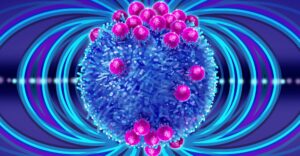
The Johns Hopkins Translational Immunoengineering is hosting a workshop series every Tuesday and Thursday in January.
The immunoengineering field is transforming cancer, autoimmunity, regeneration, and transplantation treatments by combining the diverse and complex fields of engineering and immunology. There is a significant need to train engineers in immunology and immunologists in quantitative engineering techniques. Moreover, there is a need to bridge basic immunological discoveries with advances in clinical application. This workshop will review immune system fundamentals and components, engineering strategies to modulate the immune system, and clinical applications.
After attending this workshop, the learner will demonstrate the ability to:
– Review the fundamentals and recent discoveries in the function of the immune system.
– Identify engineering strategies to manipulate the immune system.
– Describe the clinical applications of immunoengineering.
Go to their website to see schedule, speakers, topics, and registration information. Register by December 30, 2021. A late fee is applied for registering after the deadline.
This workshop is eligible for CME credit and offered as a two-credit course for Johns Hopkins students.

Is your lab ready to reduce its environmental impact?
Join My Green Lab on for a virtual panel discussion with previous Freezer Challenge participants, including JHU’s own James Leatherman, Clinical Sample Manager in the GI Oncology Research Lab at School of Medicine. They will share the strategies they used to be successful in this competition, encourage their lab colleagues to participate, and implement cold storage best practices in a variety of lab environments.
The discussion will be pertinent for lab groups already participating in the 2022 Freezer Challenge and those yet to sign up! This will be a fun, engaging conversation between colleagues with the goal of encouraging more scientists and laboratories from around the world to participate in the current Freezer Challenge. The 2022 Freezer Challenge runs until July 1, but it is not too late for additional labs to participate!
For questions about the JHU Freezer Challenge, email sustainability@jhu.edu or Green Labs Specialist, Ryan Weeks, rweeks3@jhu.edu.
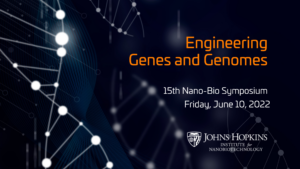
All are welcome to attend our hybrid 15th Nano-Bio Symposium on Engineering Genes and Genomes.
From draft sequencing the human genome in 2001, to the development of CRISPR editing tools in 2012, to the first FDA approved gene therapy in 2017, recent progress in genetics and genomics has been astonishing. This year’s symposium will feature the frontiers of this exciting bioengineering research with lectures, panels, and posters to showcase diverse approaches to interrogate genome structure and manipulate gene products. Attendees will learn about nanoscale system developments to deliver gene therapies in tissue and cell specific ways, RNA regulatory dynamics that govern how genotype manifests as phenotype, genomic tagging to reveal lineage relationships in development and disease, and how to bring these advances to patients through safe, efficacious, and equitable genetic medicine development. By surveying this progress, engineers, biologists, and their partners can better understand the grand challenges to altering biological systems.
This is a hybrid event where the lectures and panels will be virtual and the poster session with a reception will be in-person. Registration is required.
Learn more about the agenda, speakers, and more here.

Since 2011, Johns Hopkins employees have stepped up with generous donations to the Adopt-a-Student Uniform Drive, which assists families in purchasing the uniforms required for elementary, middle, and high school students in Baltimore City Public Schools. Donations were also expanded last year to include the purchase of essential school supplies. You can adopt one or more students by making a donation to uniforms, school supplies, or both.
If you have a question or need technical assistance, email Arnetta Shelton, Community Programs manager in the Johns Hopkins Office of Economic Development & Community Partnerships, at communityprograms@jhu.edu.
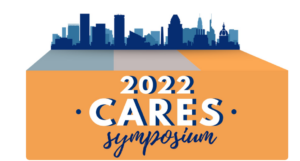
We invite you to see presentations by our summer students in INBT’s Research Experience for Undergraduates program at the CARES Symposium. Registration is required as the event is virtual.
The Hopkins C.A.R.E.S. Symposium (Career, Academic, and Research Experiences for Students) is on July 28, 2022, from 11 AM – 2:20 PM EST. The symposium provides opportunities for students who participated in a Johns Hopkins University School of Medicine pathway program to share their summer research presentations to the Hopkins community, faculty, recruits from local colleges and universities, and network with high-achieving undergraduates. All efforts will be made to make this event inclusive and accessible. To request accommodations or discuss other accessibility needs, please contact somdiversity@jhmi.edu.
INBT presenters include
Ayanna Horsford – poster presentation
Gaby Bentolila – poster presentation
Nyssa Engebo – oral presentation
Peyton Panovich – oral presentation
Christine Wei – oral presentation
Sulaiman Jenkins, Director of Academic Programs – moderator and closing remarks
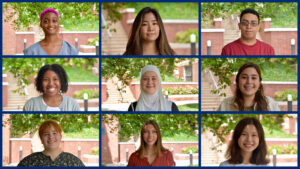
Every summer for 12 years, the INBT has welcomed undergraduate students to the Nanotechnology for Biology and Bioengineering Research Experience for Undergraduates (REU) program. Students spend 10-weeks with INBT faculty and mentors heavily engaged in research projects ranging from developing cancer therapies and diagnostic tools to using regenerative engineering to heal the body. They also participate in professional development training, networking activities, and explore Baltimore and other surrounding cities. We welcome you to join us to see presentations by our 2022 summer students as they showcase their research projects.
This event is hybrid. Space is limited in Malone Hall G33/G35 to 35 people. If space is unavailable we ask you to join by Zoom.
Zoom information
https://wse.zoom.us/j/94977263610?pwd=WFRNRU1TbEFhclBOdkxvdkxwNGI0Zz09
Meeting ID: 949 7726 3610
Passcode: 146035

Every summer for 12 years, the INBT has welcomed undergraduate students to the Nanotechnology for Biology and Bioengineering Research Experience for Undergraduates (REU) program. Students spend 10-weeks with INBT faculty and mentors heavily engaged in research projects ranging from developing cancer therapies and diagnostic tools to using regenerative engineering to heal the body. They also participate in professional development training, networking activities, and explore Baltimore and other surrounding cities. We welcome you to join us to see presentations by our 2022 summer students as they showcase their research projects.
This event is hybrid. Space is limited in Malone Hall G33/G35 to 35 people. If space is unavailable we ask you to join by Zoom.
Zoom information
https://wse.zoom.us/j/94977263610?pwd=WFRNRU1TbEFhclBOdkxvdkxwNGI0Zz09
Meeting ID: 949 7726 3610
Passcode: 146035
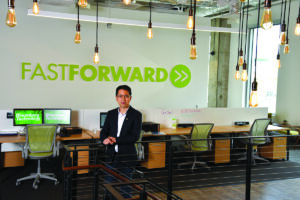
FastForward U’s accelerator programming is an opportunity for student teams from across the University to work collaboratively to make progress on their ventures. These engaging, cross-disciplinary initiatives build skills, grow networks, and connect founders with other entrepreneurial students.
Teams are grouped by stage to allow students to learn together at a pace that makes sense for where they are on their entrepreneurial journey. Spark and Fuel tracks include a stipend and the chance to win additional funds at Demo Days.
Learn more about each track.

“The Discovery of Viscosity Sensor that Facilitates the Counterintuitive Acceleration of Migrating Cells in Highly Viscous Fluids”
Yun Chen is an assistant professor of mechanical engineering at Johns Hopkins University. Her research is focused on developing tools to measure key parameters in mechanobiology, understanding the fundamental biophysical mechanisms that contribute to diseases, and applying knowledge gained from basic mechanobiology research to clinical applications. While a vast amount of effort has been invested in characterizing the biophysical properties in diseased cells and tissues, most of these efforts are limited to measuring the stiffness, diffusion, and viscosity of samples. Those properties are regarded as consequences of the diseases, rather than the causes. The abnormal biophysical traits can be the causes of the diseases, and her research has been dedicated to uncovering this commonly overlooked causality. Similarly, the unusual biophysical properties associated with diseases have been exploited as diagnosis tools, but few treatments, if any, employ biophysical principles to correct the errant biological processes known as pathology. Chen’s research group has been making significant progress on these uncharted territories. Their goal is to understand how altered biophysics in biological systems contribute to pathological processes in order to develop treatments for diseases. Their efforts include developing measurement tools to quantitatively characterize biophysical phenomena, such as axial stiffness of twisted DNA strands, differential force generation profiles and viscoelasticity of cancer cells compared to their normal counterparts, and identifying the underlying mechanisms for such differences, which can be exploited for disease diagnosis and treatment.
Extracellular fluid (ECF) is a critical component of the body. Cells are surrounded by and move through biological fluids that span orders of magnitudes of viscosity in vivo, including mucus, saliva, blood, and synovial fluid, among others. Interstitial fluid in the tumor microenvironment is viscous, ascites in cancer patients is highly viscous, and the mucus of patients with cystic fibrosis is highly viscous. Elevated viscosity in the tumor microenvironment and in ascites can increase the rate of cancer cell motility and promote metastasis. Elevated viscosity in mucus can inappropriately increase the migration of fibroblasts to airway wounds incurred in patients with cystic fibrosis, resulting in the worsening of fibrosis. Increases in ECF viscosity are also associated with aging and many other diseases. Despite the profound implications of ECF viscosity, our understanding of the mechanosignaling pathways that allow cells to respond to viscosity changes and the underlying mechanism leading to increased cell speeds is very limited. To gain more insights, we used bio-compatible polymers to mimic viscous ECF, aims to fill this knowledge void. We conducted detailed characterization of the cellular responses to viscosity – from the time point immediately after viscosity is increased to hours afterwards, and from single molecule force measurement to dynamic 3D cellular morphology profiling. We observed that cells immersed in highly viscous medium, which had a consistency similar to that of honey, drastically changed morphology and began moving nearly twice as fast. Step by step, we dissected the molecular cascade leading to the cell speed increase in response to elevated viscosity. Combining numerical simulation and experimental data, we showed that membrane ruffling, a common feature of adherent cells, acts in effect as a sensor of ECF viscosity, probing the hydraulic resistance of the surrounding fluid and triggering adaptive responses. In summary, we demonstrate for the first time that a universal viscosity sensing mechanism exists in adherent cells to actively probe and adapt to changes in the viscosity of the microenvironment. The physical interplay between mechanical forces that power membrane ruffling and the counteracting hydraulic resistance is at the heart of this sensing mechanism.

Uniquely among mammalian organs, skin is capable of dramatic size changes in adulthood, yet the mechanisms underlying this striking capacity are unclear. The Reddy lab recently developed a method to induce controlled skin growth in genetically tractable mice. Using machine learning-guided three dimensional tissue reconstruction, they discovered that skin growth is driven by proliferation of the epidermis in response to mechanical tension, with more limited changes in dermal and subdermal compartments. Epidermal growth is in turn achieved through preferential activation and differentiation of Lgr6+ stem cells of the epidermis, controlled in part by the Hippo pathway. Single-cell RNA sequencing uncovered further changes in mechanosensitive and metabolic pathways underlying growth control in skin. These studies point to therapeutic strategies to enhance skin growth and establish a platform for understanding organ size dynamics in adult mammals.
Those who cannot attend in person can watch on Zoom.
About the speaker
Dr. Sashank Reddy completed his undergraduate studies at Johns Hopkins as a Beneficial Hodson Scholar, followed by MDPhD studies at Harvard Medical School and MIT under the auspices of the NIH Medical Scientist Training Program. Following his clinical training at the Johns Hopkins University School of Medicine, Dr. Reddy joined the faculty in 2019. His NIH-funded laboratory studies developmental biology and regenerative medicine with a particular focus on soft tissues. Dr. Reddy is also an accomplished biomedical innovator and a founder of venture-backed companies. In his role at INBT, Dr. Reddy works to grow the scientific and translational excellence of the Institute.


